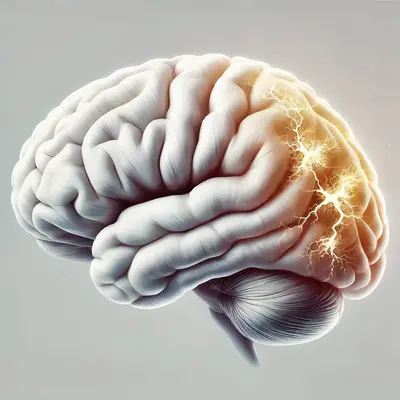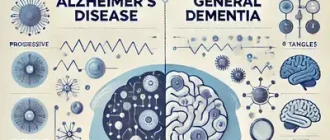Alzheimer’s disease is a progressive neurological disorder that affects memory, thinking, and behavior. Identifying early signs and symptoms can be crucial for timely intervention and support.
Comparison of Early Symptoms of Alzheimer’s vs. Normal Aging
| Symptom | Alzheimer’s (%) | Normal Aging (%) |
|---|---|---|
| Memory Loss | 90% | 30% |
| Disorientation | 80% | 20% |
| Word-Finding Difficulty | 85% | 40% |
This chart highlights the percentage differences in symptoms between Alzheimer’s and normal aging, emphasizing the prevalence of significant memory loss and disorientation in Alzheimer’s patients.
What Are the Early Signs of Alzheimer’s Disease?
Recognizing early symptoms can make a significant difference. Here are some common initial signs:
- Memory Loss: Forgetting recently learned information, appointments, or events. A distinctive feature of Alzheimer’s is the progressive nature of memory loss, which begins with short-term memory but gradually extends to long-term memories as the disease advances. For example, patients may repeatedly ask the same question despite being answered moments earlier.
- Difficulty with Problem-Solving: Struggling with tasks like following a recipe or balancing a checkbook. Unlike normal aging, this involves a marked decline in the ability to follow sequential steps or complete multi-step processes, such as paying bills or assembling simple devices.
- Disorientation: Getting lost in familiar places or losing track of time. This symptom is specific to Alzheimer’s in that the disorientation is consistent and unrelated to external stressors, often leading to patients wandering and being unable to retrace their steps.
- Changes in Mood or Personality: Experiencing confusion, anxiety, or withdrawal from social activities. In Alzheimer’s, these changes often reflect deeper neurological impairments and are accompanied by paranoia or frustration when the person cannot recall names or places.
- Trouble Finding Words: Pausing frequently or substituting unusual words in conversations. A clear indicator is when individuals refer to objects by overly generic terms or create nonsensical replacements, such as calling a “watch” a “hand clock.” A case from medical practice involved a patient consistently referring to their family car as “that moving house.”
Progression of Memory Loss in Alzheimer’s
| Stage | Memory Loss Severity (%) |
|---|---|
| Early Stage | 30% |
| Moderate Stage | 60% |
| Severe Stage | 90% |
This chart illustrates the progression of memory loss in Alzheimer’s patients, starting with mild memory issues in the early stage and advancing to severe memory impairment in later stages.
How Is Alzheimer’s Disease Diagnosed?
Diagnosis requires a multi-step process involving various tests and evaluations. These typically include:
1. Medical History
Your healthcare provider will ask about:
- Family history of dementia. This helps identify potential genetic risks, such as mutations associated with early-onset Alzheimer’s.
- Previous medical conditions that might mimic Alzheimer’s symptoms (e.g., depression, vitamin deficiencies). These evaluations are critical to rule out treatable causes of cognitive impairment.
The cost of this step varies widely but is generally covered by insurance in the U.S. Accessibility is high, as most primary care doctors can perform this evaluation. Its accuracy in identifying risk factors and excluding other conditions is foundational for further diagnosis.
2. Cognitive and Neuropsychological Testing
These tests measure:
- Memory.
- Problem-solving abilities.
- Language and reasoning skills.
These assessments are often conducted by a neuropsychologist and take several hours to complete. Costs range from $500 to $5,000 depending on the depth of evaluation and location. They are widely available in most metropolitan areas and are crucial for detecting subtle cognitive changes early.
3. Physical and Neurological Exam
This step checks:
- Reflexes.
- Muscle tone and strength.
- Sensory responses.
These examinations ensure that symptoms are not caused by neurological conditions like stroke or multiple sclerosis. The process is straightforward, generally performed during a standard doctor’s visit, and covered by insurance. It provides critical insights into the physical effects of potential neurological decline.
4. Imaging Tests
Commonly used techniques include:
- MRI or CT scans to detect brain atrophy. These are especially effective in identifying structural changes in the brain linked to Alzheimer’s.
- PET scans to identify amyloid plaques, a hallmark of Alzheimer’s.
MRI and CT scans cost $500 to $3,000, while PET scans are significantly more expensive, often exceeding $5,000. Availability can vary, with PET scans being less accessible in rural areas. Despite their cost, these tests are essential for confirming a diagnosis and informing treatment plans, offering high accuracy in detecting Alzheimer’s-specific changes in the brain.
When Should You See a Doctor?
If you or a loved one experience persistent memory issues or cognitive difficulties, consult a physician promptly. Early diagnosis can help:
- Access available treatments sooner.
- Plan for the future.
- Connect with support groups and resources.
Can Alzheimer’s Be Prevented?
While there’s no definitive way to prevent Alzheimer’s, certain lifestyle changes may reduce your risk:
- Stay Mentally Active: Engage in puzzles, reading, or learning new skills. Experts suggest activities like crosswords or learning a new language can be particularly beneficial. Incorporating brain training apps designed to improve memory and focus may also provide advantages.
- Exercise Regularly: Physical activity improves brain health. According to recent studies, combining aerobic exercises like walking or cycling with strength training can have a synergistic effect on cognitive functions.
- Healthy Diet: Consume foods rich in antioxidants, omega-3 fatty acids, and vitamins. Specialists recommend the Mediterranean diet, emphasizing fruits, vegetables, fish, and olive oil, for its proven benefits in reducing cognitive decline.
- Control Chronic Conditions: Manage diabetes, high blood pressure, and cholesterol levels. Consistent monitoring and timely intervention, such as taking prescribed medications or using wearable health tech, play a critical role in minimizing risks linked to Alzheimer’s.
Lifestyle Factors Reducing Alzheimer’s Risk
| Lifestyle Factor | Impact on Risk Reduction (%) |
|---|---|
| Regular Physical Exercise | 80% |
| Healthy Diet (Mediterranean) | 70% |
| Mental Stimulation Activities | 60% |
| Social Engagement | 50% |
| Managing Chronic Conditions | 40% |
This chart illustrates how various lifestyle factors contribute to reducing the risk of Alzheimer’s, with regular exercise and a healthy diet showing the highest impact.
Frequently Asked Questions
1. Is Alzheimer’s the same as dementia?
No. Dementia is a general term for cognitive decline that encompasses various conditions, while Alzheimer’s is a specific disease and the most common cause of dementia. Alzheimer’s is characterized by progressive memory loss, impaired cognitive function, and behavioral changes. It often begins subtly, distinguishing it from other forms of dementia like vascular or Lewy body dementia.
2. Can young people get Alzheimer’s?
Yes, early-onset Alzheimer’s can occur in individuals as young as their 30s or 40s, although it is rare. This form of the disease is often linked to genetic factors, such as mutations in specific genes like APP, PSEN1, or PSEN2. People with early-onset Alzheimer’s may face unique challenges, including the disruption of careers and family life at a young age, requiring tailored support and care strategies.
3. Are there treatments for Alzheimer’s?
While there’s no cure, medications like cholinesterase inhibitors and lifestyle adjustments can help manage symptoms. These treatments aim to improve quality of life and delay progression. For instance, cholinesterase inhibitors can enhance communication between nerve cells in the brain, while other medications like memantine may reduce symptoms of moderate to severe Alzheimer’s. Emerging therapies and clinical trials continue to offer hope for more effective solutions in the future.
Common Misdiagnoses in Early Alzheimer’s Symptoms
| Condition | Misdiagnosis Rate (%) |
|---|---|
| Depression | 70% |
| Vitamin Deficiency (e.g., B12) | 50% |
| Vascular Dementia | 60% |
| Thyroid Disorders | 40% |
| Normal Pressure Hydrocephalus | 30% |
This chart highlights the common conditions that are often misdiagnosed as Alzheimer’s, with depression having the highest misdiagnosis rate at 70%.
Editorial Advice
If you or someone close to you is showing signs of Alzheimer’s, seek medical advice as early as possible. Awareness and early action can significantly impact the quality of life and the effectiveness of treatments. Prioritize a healthy lifestyle and regular check-ups to maintain cognitive health.
About the Author
Reyus Mammadli is the author of this health blog since 2008. With a background in medical and biotechnical devices, he has over 15 years of experience working with medical literature and expert guidelines from WHO, CDC, Mayo Clinic, and others. His goal is to present clear, accurate health information for everyday readers — not as a substitute for medical advice.







